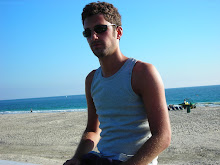Truly we live in exciting times. Forget, for a moment, the doomsday economic downturn, threatening the very fabric of our financial services industry and ultimately the entirety of western capitalism as we know it, and consider this brave new world in which we inhabit, a society constantly changing and progressing to an entrepreneurial, enterprising beat. We may have a weaker pound, rising inflation and worrying levels of unemployment, but as of yesterday afternoon we also have the iPad.
Granted, I am not overwhelmed with certainty as to exactly what purpose the iPad serves. Is it a gigantic phone, created to make us all feel like we are in a new series of The Borrowers? Is it a lighter, more efficient laptop, designed to liberate us from the shackles of office tedium, prompting a revolution of pedestrianism, letting us work not just from home, not just in the office, but in fact practically anywhere at any time? Not that the iPad is limited to business-related tasks. This is a model designed to improve gaming experiences, open up a whole industry of e-books, and collate together an already burgeoning world of iPhone applications into one portable tablet. It's the technological form of NurofenPlus, minus the layered codeine.
The emergence of the iPad is both a tangible, physical stage in the technological revolution happening right now across the world. It is also deeply symbolic. With Apple's computerised tablet, the internet is closer, more accessible, faster and easier than ever before. Knowledge, information, progress is just a touchscreen away. Compartmentalising every single aspect of world-wide social networking, entertainment and communications into one movable device may seem, at first glance, to be a great opportunity to collate what we feel, think and know, what we do and how we act, into a singular entity. The reality, however, is that while the iPad can bring these literal and metaphorical elements together, we are in essence still working through an immeasurably large pool of detail. It may be all on one machine, but modern man still has himself (or herself) spread thinly over vast expanses.
We Facebook, Tweet, and blog. We surf, game, read and listen. At the moment, many of us do all these acts many times a day, through a variety of sources. I may play Football Manager on my laptop, reply to emails via Blackberry, and tweet about how mind-numbingly boring/fascinating (delete where appropriate) these actions are on my Nokia NSeries. The iPad would let me do all of this on one device, wherever I may be in the world, but my specific actions are still broad. It calls into question what levels of knowledge we really have in a new decade, and whether it is a help or a hindrance to our future careers.
Which is better: to have an in-depth level of knowledge regarding a specific subject or industry or, alternatively, reasonable information over a wider area? Modern business seems unsure of itself, unable to confirm whether focused study of a singular area is more beneficial than nuggets of knowledge spread thin. In the legal profession, for example, City law firms are adapting to the credit crunch by having to focus more on corporate restructuring, rather than the mergers and acquisitions of yore. Should solicitors, and their firms, focus on training staff to deal stoically with the challenges of commercial law in a recession, and therefore limiting skills and training to very specific corporate recoveries, or should trainees have a broad spectrum of knowledge in a number of fields, ready to adapt to a changing economic landscape and the varying needs of their clients. On the one hand, very specific knowledge will be invaluable to clients in desperate need of certain advice in absolute situations. Alternatively, some firms may profit from their lawyers being able to respond with merely a modicum of ability to a range of issues.
Technology is driving the second of these possibilities, by providing us with mechanisms and devices through which we can find information, but not necessarily knowledge. Our technological revolution aids communication, but perhaps not ability, intellect and expertise. Ben Macintyre, writing in today's edition of The Times, illustrates this most modern of conundrums by focusing on the differences in intellectual thought as set out by the 1950s philosopher Isaiah Berlin: some thinkers are foxes; some are hedgehogs.
Which are you? A fox, knowing many things, or a hedgehog, knowing one big thing? Macintyre argues that today, 'feasting on the anarchic, ubiquitous, limitless and uncontrolled information cornucopia that is the web, we are all foxes'. The vast, unfathomable torrents of information that are now, thanks to devices like the iPad, just a touchscreen swipe away, have changed the way we think, act, communicate and, ultimately, do our jobs. As the world gets smaller than it has ever been, our ability, almost by osmosis, to seep in information gets larger. As Macintyre states, 'we can go on instant mind-journeys that once would have taken years'.
I feel a little bit like Arthur Miller's choric character Alfieri, in his sublime 'A View From The Bridge'. Alfieri argues that we now 'settle for half'. The vast societal changes in his world, he feels, can be bridged by a sensible complimenting of what we knew and what we will go on to know. In the rapid currents of an at times unstable and ever-changing world in 2010, it is no bad thing to find a via-media between the foxes and hedgehogs. Indeed, there is no reason why both cannot cohabit the same iPad. We need the foxes to streak ahead, scavenging their way through the multitude of possibilities and applications that a work of art such as the iPad can both provide and collate. We also need the hedgehogs, the big thinkers in microcosmic areas. Without the symbiosis of these two, our technological revolution will crumble and with it modern society as we know it. There would be no iPad without the hedgehogs at Apple. There would be no use of an iPad without the foxes of modern society.
We go about our business, our day-to-day lives, with little thought or concern for the vast happenings around us. I will most probably purchase an iPad. I like its sleek design, its modern urgency. However, stopping for just a moment, pausing and reflecting over our societal sea-change, I am inclined to be feel both excited and a little apprehensive, caught as I am (and amongst many who are in similar positions) between being a fox and being a hedgehog.

